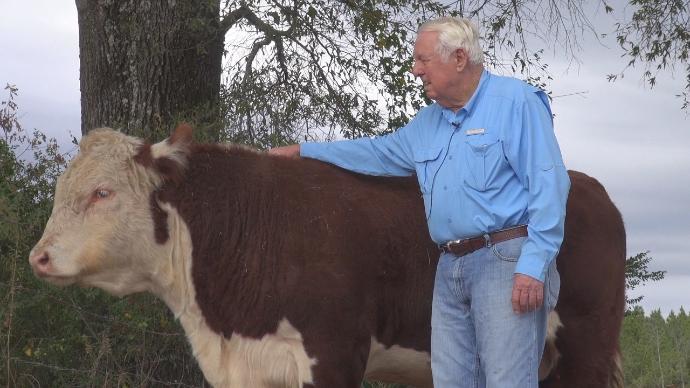The beef packing industry is now dominated by four large multinational corporations – Cargill, Tyson, the Brazilian firm JBS and National Beef Packing, which is controlled by another Brazilian company.
Country of origin labeling for beef was repealed in 2015.
And the beef checkoff – a $1 tax on the cow every time it is sold – funnels millions of dollars to beef promotion groups that side with the beef packing monopolists against the farmers.
For almost fifty years now, Fred Stokes, a cattle farmer in Porterville, Mississippi, has been seeking to give the family farmer a fair shake in the marketplace – to bring back country of origin labeling, to bust up the big four and to repeal or reform the checkoff.
In the late 1980s, he helped organize a group called the Organization for Competitive Markets to achieve these goals.
It is still running now more than 20 years later.
What has been the outcome?
“I would say we drilled a dry hole,” Stokes told Corporate Crime Reporter in an interview last month. “It’s painful to admit that. Our goal was never to build a big organization or raise a lot of money. We were out to change things on the ground and make the market fair. But we were trumped by big corporate power.”
Stokes does see hope on the horizon. But he has seen it before.
“There are some things happening now that I pray are sincere,” Stokes said. “President Biden just signed an executive order to usher in an era of competition and antitrust era enforcement. Obama did the same thing. You interviewed me about that back in 2011. But we were sucker punched. It was a lie. It didn’t happen.”
“But I know some of the underlings in this effort and I believe they are sincere. Of course, I believed that was the case in the Obama administration. But ultimately, political expediency won.”
“But they say that the new executive order will clarify that meat can only receive a product of the USA label if that livestock is raised in the U.S. rather than abroad.”
“We have been fighting all of these years for compulsory country of origin labeling of food.”
“Country of origin labeling was in effect for a couple of years for beef and pork – very briefly. The market shot up. Then, in 2015, Congress voted to repeal country of origin labeling for beef and pork. And the bottom fell out.”
“Remember, 90 percent of the voting public says – we want country of origin labeling. And then the entire Mississippi delegation to the House of Representatives voted for a repeal of mandatory country of origin labeling and against the express interest of 90 percent of their constituents. There is only one reasonable answer.”
Legalized bribery?
“Absolutely. They are bought.”
Earlier this month, the Organization for Competitive Markets held a press conference to bring attention to bipartisan legislation introduced by Congresswomen Dina Titus (D-Nevada) and Nancy Mace (R-South Carolina) designed to reform and bring accountability and transparency to reform the USDA’s Commodity Checkoff Programs.
They said the programs have long been plagued by scandal after scandal for misappropriation of funds, lack of transparency, and misusing farmer and rancher tax dollars against the best interests of the producers to further the agenda of industrial agriculture.
“This legislation will bring much-needed accountability and transparency to USDA’s checkoff programs which have operated without sufficient oversight for far too long,” Titus said. “Family farmers should not be forced to pay into organizations that sometimes lobby against their interests and threaten animal welfare.”
“The USDA’s Checkoff Program was supposed to ensure American farmers of all sizes could promote their products across the nation and across the globe,” Mace said. “For years now, small farmers have seen their hard-earned money used to fund the lobbying efforts of massive, multi-billion-dollar agriculture conglomerates. This program has evolved from producing Got Milk? ads to creating taxpayer-funded lobbying firms, and it needs to stop.”
The two big issues for the Organization for Competitive Markets is country of origin labeling and the checkoff?
“Our core mission is to foster competition,” Stokes said. “One of the recent ways we are attempting to do that is to try and encourage and incentivize an expansion of independent meat processing to compete against the big four monopoly. We want other people out there bidding for our cattle. There is currently a USDA program to do this – to give grants and loans and special market access to bring new competition to the meat processing business. That’s one of the best ideas we have heard in a long time. Independent meat processing has just evaporated over the years. We need to bring it back.”
When we interviewed you in 2011, you said you considered yourself a Teddy Roosevelt Republican. Are you still that?
“I am.”
Was Trump a Teddy Roosevelt Republican?
“Trump knows little to nothing about agriculture and was surrounded by a bunch of people who acted in bad faith. If he really understood, he would have taken different actions. These people know how to play the game.”
Trump ran against the swamp, but surrounded himself by swamp dwellers?
“Absolutely. That’s the way to put it. That is what I believe. The people who surrounded him were not people who wanted competition in the marketplace.”
[For the complete Interview with Fred Stokes, 35 Corporate Crime Reporter 28(13), Monday July 19, 2021, print edition only.]
